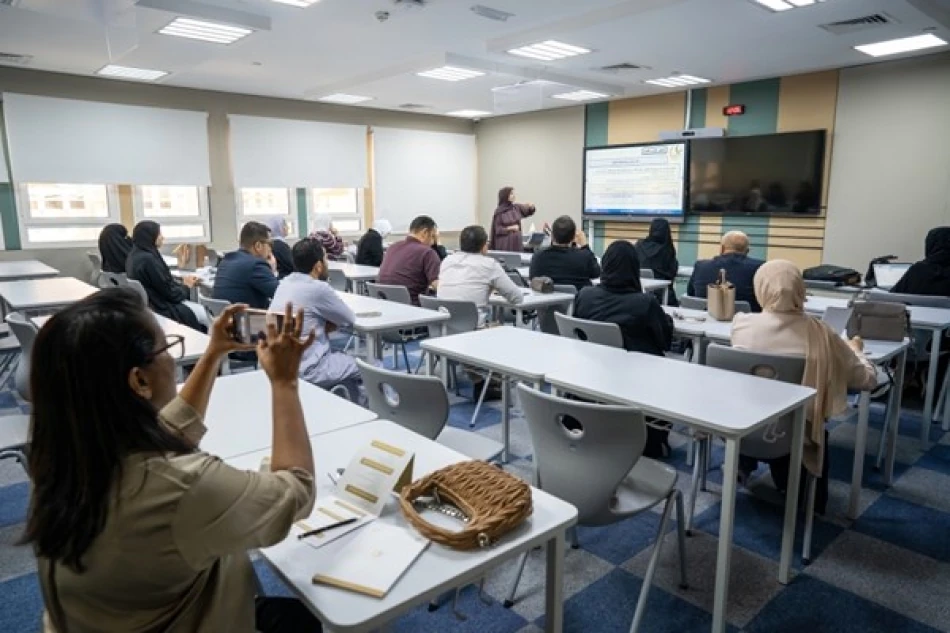
Khalifa Educational Foundation Hosts Hands-On Workshops for 19th Edition Offerings
UAE's Khalifa Educational Award Expands Excellence Framework with AI Integration and Family Recognition
The UAE's prestigious Khalifa Educational Award has launched its 19th cycle with an ambitious expansion that reflects the nation's evolving educational priorities. The program now encompasses 10 distinct fields across 17 categories, introducing groundbreaking elements including artificial intelligence integration in higher education and formal recognition of exceptional Emirati families who create environments fostering academic excellence. This strategic evolution positions the UAE as a regional leader in comprehensive educational development, moving beyond traditional teacher recognition to embrace holistic community involvement in learning outcomes.
Strategic Partnership Signals Institutional Collaboration
The award's secretariat, operating under the Zayed Humanitarian Legacy Foundation, has partnered with Mohammed bin Zayed University for Humanities in Abu Dhabi to host the excellence workshops. This collaboration represents more than logistical convenience—it demonstrates the UAE's systematic approach to building educational ecosystems where academic institutions, government entities, and civil society organizations work in concert.
Hamid Al Hawti, Secretary-General of the Khalifa Educational Award, emphasized the importance of this partnership, noting how specialized experts and academics across various educational fields participated in the workshops. This multi-stakeholder approach mirrors successful educational transformation models seen in Singapore and Finland, where comprehensive reform requires buy-in from all levels of the education system.
Innovation Categories Reflect Modern Educational Challenges
Creative Teaching and Institutional Performance
The program's focus on "Creative Teachers" goes beyond traditional pedagogical excellence. Workshops led by Dr. Naima Al Housni and Raeda Faisal outlined performance indicators that measure exceptional teaching at both local and regional levels. This emphasis on measurable creativity aligns with global trends toward evidence-based educational assessment, similar to initiatives in South Korea and Canada that quantify innovative teaching methods.
The "Institutional Educational Performance" category encompasses general education schools, technical institutes, and private schools, evaluating them as integrated educational institutions. This holistic assessment approach recognizes that educational excellence requires systemic institutional commitment rather than individual teacher heroics.
Inclusion and Community Integration
The award's dedicated category for "People of Determination" (individuals with disabilities) reflects the UAE's broader commitment to inclusive education. Presenters Baria Suleiman, Khaled Abu Alwan, and Dr. Khaled Al Barakat outlined comprehensive care approaches for various disability categories, emphasizing specialized centers' role in community integration.
This focus on inclusion positions the UAE ahead of many developed nations still struggling with disability integration in mainstream education. The systematic approach to recognizing institutions and individuals who excel in this area creates powerful incentives for broader adoption of inclusive practices.
Technology Integration and Future-Focused Learning
Perhaps most significantly, the higher education workshops explicitly emphasized integrating artificial intelligence and advanced technology into educational processes. Dr. Laabidi Bouabdallah and Dr. Fathallah Ali Rihan stressed sustainability concepts alongside AI integration, recognizing that future educational excellence requires both technological sophistication and environmental consciousness.
This dual focus on AI and sustainability reflects the UAE's Vision 2071 goals and positions the nation's educational sector to compete globally in emerging technology sectors. Unlike purely technology-focused initiatives in other countries, the UAE's approach balances innovation with social responsibility.
Market and Investment Implications
The award's expansion signals substantial government investment in educational infrastructure and human capital development. For private education providers and edtech companies, the UAE's systematic approach to recognizing and rewarding innovation creates clear market opportunities. The emphasis on AI integration particularly benefits technology firms specializing in educational applications.
International education consultancies and curriculum developers should note the UAE's comprehensive framework, which offers a template for other Gulf states likely to adopt similar approaches. The recognition of family contributions also suggests growing demand for parent education and family engagement services.
Regional Leadership Through Comprehensive Excellence
The Khalifa Educational Award's 19th cycle represents more than incremental improvement—it demonstrates the UAE's systematic approach to educational transformation. By recognizing excellence across teaching, institutional performance, research, creative writing for children, and innovative educational projects, the program creates a comprehensive ecosystem of educational excellence.
The inclusion of Arabic language creativity workshops, led by Dr. Majdi Bin Souf and Mahra Al Nuaimi, particularly reinforces cultural identity while embracing global educational trends. This balance between local values and international standards offers a sustainable model for educational development that other nations in the region are likely to emulate.
The program's success will ultimately be measured not just in award recipients, but in the systemic improvements it generates across the UAE's educational landscape. Early indicators suggest this comprehensive approach may establish new benchmarks for educational excellence in the Middle East.
Most Viewed News

 Layla Al Mansoori
Layla Al Mansoori






